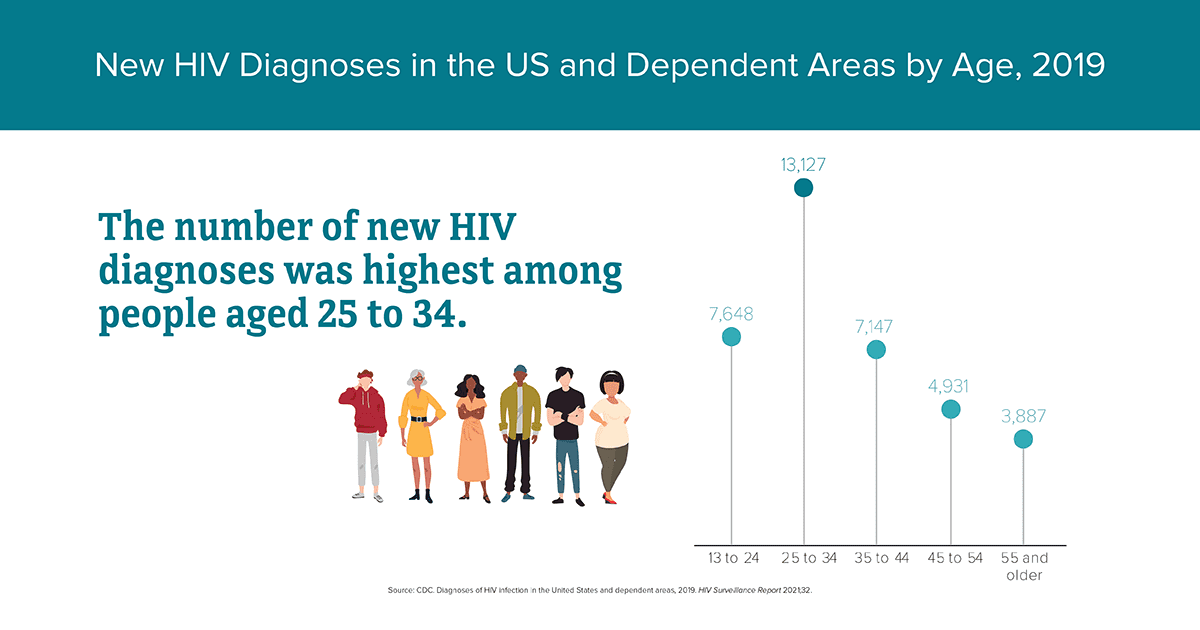Although there is currently no cure for HIV or AIDS, modern medicine has made it possible for long-term aging with HIV. During the darkest points of the AIDS crisis in the 80s, patients with HIV were only expected to live to their 40s. But today, the average lifespan for a person living with HIV is now the same as the general population – if they receive treatment.
Before antiretroviral medication became readily available, many people died at such a young age because there were no options to prevent or treat HIV. But now, people living with HIV can go on to live long, healthy lives with minimal complications. Today over half of the people in the United States living with HIV are over 50 years old!
So, can you live a normal life with HIV? The answer is undoubtedly yes, but only if you receive the proper treatment and medical care.
Here are some things to know about HIV and aging and how to ensure a healthy, long life if you are living with HIV.
Common Health Concerns for Aging and HIV
HIV is a virus that suppresses the immune system as it naturally tries to fight it off. Without antiretroviral drugs, the virus overtakes healthy immune cells. This leaves the body more susceptible to other illnesses, like infections and even types of cancer.
The antiretroviral medication prevents HIV from reproducing in the body. This in turn allows the immune system to repair itself and stop trying to fight off the virus. When taken continuously, antiretroviral drugs can reduce the person’s viral load so it is undetectable – and therefore, untransmittable.
While this does not cure them of HIV, it does mean that they cannot pass it to anyone else. For most people, antiretroviral drugs have minimal health effects. But it can cause some allergic reactions or long-term health issues down the road, including bone loss, heart disease, diabetes, and liver damage.
People at an older age are often more susceptible to most diseases and illnesses. Although HIV medication helps to prevent immune system damage, people living with HIV may be slightly more likely to develop chronic health conditions.
If the immune system has been damaged, it can leave a person living with HIV slightly more susceptible to other health issues that come along with aging. According to research from HIV.gov, people over the age of 50 who have been diagnosed with HIV have a slightly higher risk of developing conditions such as:
- Cardiovascular disease
- Diabetes
- Kidney disease
- Cancer
- Chronic inflammation
However, HIV does not directly cause these diseases. Many factors contribute to these diseases, such as weight, family history, and pre-existing health conditions. It is very important for people living with HIV to maintain healthy lifestyles by eating right and exercising within reason to maintain their overall wellbeing.
HIV and the Brain
When the immune system reacts to a foreign body, such as a virus, it can cause inflammation. This is a natural response that helps to fight off diseases. Although this response is slightly suppressed through antiretroviral medication, HIV causes some level of chronic inflammation in the body.
Chronic inflammation can cause tissue damage to many organs, including the brain. This can lead to cognitive and motor issues caused by brain damage. Medical studies have concluded that between 25-50% of people living with HIV above the age of 50 have a condition along the spectrum of cognitive, motor, and/or mood disorders.
Depending on the severity of the condition, this may be quite mild or even asymptomatic. However, some may develop HIV-Associated Neurocognitive Disorder (HAND), which can cause memory loss, difficulty concentrating, irritability, and depression.
Late in Life HIV Diagnosis can Lead to Further Health Complications
Although the number of new HIV diagnoses has decreased since 2015, many people are not getting diagnosed with HIV until they are older in life. One in six new diagnoses is among people over 50. Sadly, this means that they have gone longer without treatment and have a higher viral suppression rate. This can result in health issues down the road.

Many people living with HIV above the age of 50 are unaware of their status due to not testing. The earlier you start to treat HIV, the better. This will prevent long-term damage to the immune system.
People of all ages need to learn the basics about HIV, such as how it is transmitted, symptoms, and prevention methods. Many symptoms of HIV are confused with normal signs of aging or other illnesses, as they include:
- Fatigue
- Loss of appetite or weight loss
- Flu-like symptoms
- Headaches
- Sore throat
- Muscle aches
There is also a stigma around people of older ages for getting tested, which often prevents them from doing so. But ignoring the signs and putting off HIV testing will only make matters worse. The sooner a person is diagnosed, the sooner they can receive treatment and suppress their viral load.
The Earlier You Get Tested, The Better
It is important to be vigilant about getting tested for HIV every year, and even more often if you are at high risk of transmission. Being informed about HIV transmission, prevention, and treatment is the best thing you can do to protect yourself and others.
SIDE by SIDE is an organization dedicated to providing resources and support to ultimately end HIV. We can help you find testing sites in your area, learn more about effective prevention methods, and get connected with health providers for treatment.





